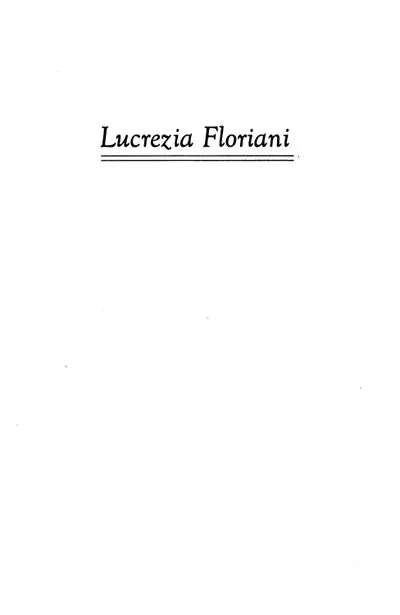Then to Nohant. Publishes Un Hiver À Majorque, Pauline and Gabriel-Gabrielle.
October Occupies adjoining apartments with Chopin until spring of 1841 at 16 Rue Pigalle, Paris, in winter. Summer is spent at Nohant with Chopin as guest.
1840
Writes Compagnon Du Tour De France and Horace. Influenced by Pierre Leroux.
1841
Moves from Rue Pigalle to 5 and 9 Rue St.-Lazare, Square d’Orléans, with Chopin.
1842
Consuelo published.
1843
La Comtesse De Rudolstadt published, a sequel to Consuelo.
1844
Jeanne published, a foreshadowing of pastoral novels.
1845
Têvérino, Péché de M. Antoine and Le Meunier D’Angibault, the latter two socialist novels.
1846
La Mare Au Diable published and Lucrezia Floriani. Solange married to Auguste-Jean Clésinger. Estrangement from Chopin.
1847
François Le Champi published.
1848
Writes government circulars, contributes to Bulletins de la Republique and publishes her own newspaper La Cause du Peuple, all for the Second Republic. Death of Solange’s son. La Petite Fadette published.
1849
Her play based on François Le Champi performed at the Odéon. First of a series of successful plays.
1850
Chateau des Désertes published in the Revue Des Deux Mondes.
1851
Republic falls. She uses her influence to save her friends from political reprisals. Plays Claudie and Le Mariage De Victorine presented.
1852
Return to Nohant.
1853
Published Les Maîtres Sonneurs. Play Le Pressoir presented.
1855
Four volume autobiography Histoire De Ma Vie published, carries her life to Revolution of 1848.
January 13 Death of Solange’s daughter Jeanne. Visit to Italy with Maurice and Alexandre Manceau.
1856
Does French adaptation of As You Like It.
1858
Holidays at Gargilesse on River Creuse at cottage given her by Alexander Manceau.
1859
Writes Elle Et Lui. Publishes Jean De La Roche and L’Homme De Neige.
1860
Writes La Ville Noire and Marquis De Villemer.
November Contracts typhoid fever.
1862
May 16 Marriage of Maurice Sand and Caroline Calametta.
1863
July 14 Marc-Antoine Sand born, son of Maurice and Caroline.
Mademoiselle La Quintinie published, anti-clerical novel. Begins friendship with Flaubert.
1864
Play Le Marquis De Villemer presented. Death of Marc-Antoine Sand. Moves from 3 Rue Racine near the Odéon to 97 Rue des Feuillantines. Exchanges Gargilesse for a house at Palaiseau with Manceau.
1865
Death of Manceau.
1866
Visits Flaubert at Croisset, dedicates Le Dernier Amour to him. Birth of Aurore Sand.
1867
Return to Nohant to live with Maurice and Caroline. Writes two novels a year.
1868
Birth of Gabrielle Sand.
1870
The play L’Autre with Sarah Bernhardt, presented at the Theatre Francais.
1870-1871
Franco-German War. Removal to Boussac because of a smallpox epidemic at Nohant.
1876
June 8 Dies.

1.
Young Prince Karol de Roswald had just lost his mother when he first met Madame Floriani.
He was still plunged in utter grief and nothing could distract him from it. Princess de Roswald had been a tender and perfect mother. As a child Karol was weak and ailing and she had lavished on him the most constant care and devotion. Brought up under the eye of this good and noble woman the young man had only one real passion in his entire life: filial love. This mutual love between son and mother had made them as it were exclusive, and possibly a little too absolute in their way of seeing and feeling things. It must be said that the Princess was highly educated and possessed a superior mind; the lessons she gave him and her conversations with him seemed capable of satisfying every one of young Karol’s needs. His delicate health had resisted the toil, rigour and harshness of classical studies which in themselves are not always as valuable as the lessons of an enlightened mother, but they have the indispensable merit of teaching us to work and are, so to speak, the key to knowledge of life. Acting on the advice of her son’s doctors Princess de Roswald had dismissed the idea both of tutors and books and had resolved to form the mind and heart of her son by her conversation, by the stories she narrated, by a kind of insufflation of his moral being which the young man had absorbed with great delight. Thus he had succeeded in acquiring much knowledge without ever having studied anything.
But nothing can replace experience; and the box on the ear which, when I was a child, was given to youngsters to impress on their memories a great emotion, a historical fact, a notorious crime or any other example to follow or avoid, was not so stupid a practice as it appears to us nowadays.
1 comment